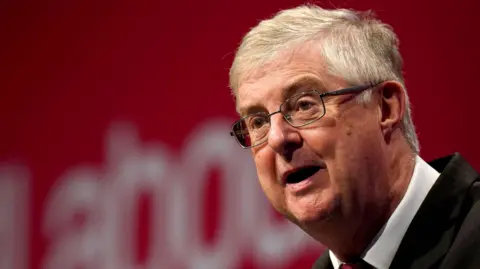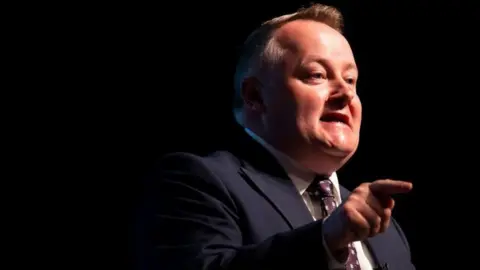NHS, housing and councils winners in budget plans
 PA Media
PA MediaDay-to-day spending on most public services will be hiked by more than 2% under Welsh government plans for 2026-2027.
The NHS, local government and housing appear to be the main winners in its draft budget for the next financial year with 2.5% and 2.3% rises.
Publishing it, Finance Minister Mark Drakeford said the proposals showed "we're protecting the services people rely on most".
Inflation is currently 3.8% but the Office for Budget Responsibility (OBR), expects inflation to be nearer 2% next year.
After losing a seat in the Caerphilly by-election, the Welsh Labour government does not have enough Senedd members to pass a budget without making a deal with at least two opposition members.
Drakeford said: "We remain open to working with other parties in the Senedd to build an even more ambitious budget."
Funding for the Welsh government from devolved taxes and the UK government's block grant in 2026-27 is £27.6bn.
There is now about £380m of unallocated funding.
More than 75% of the government's budget is spent on health, social services, housing and local government.
The transport budget is to go up 4.3%, though this is a small portion of government spending. Climate change and rural affairs is getting a 3.1% rise, and education 2.2%.
The increases are based on comparing what the government plans to spend next year against what is being spent this financial year.
Drakeford said: "Every key department will see increased funding, providing the stability our public services need."
There are concerns the proposed increases will just cover inflationary public sector pay rises.
'Historically low NHS spending rise'
The Welsh Local Government Association previously warned of steep council tax rises or local authority job cuts without a significant budget increase.
Cardiff University's Welsh Governance Centre's Guto Ifan said of the 2.5% planned rise in Welsh health service spending: "This would still be an historically low increase in NHS spending."
Tuition fees at Welsh universities will increase from next September, matching an uplift for universities in England.
The Welsh government said the hike for 2026-27 - which is expected to see maximum fees rise from £9,535 a year to around £9,900 - comes as financial pressures on universities continue.
Minister for Further and Higher Education Vikki Howells said living costs support for Welsh students would increase by 2%, including the first rise in the maintenance grant since 2018.
Last month the UK government announced that tuition fees in England will increase every year in line with inflation from 2026 onwards.
Universities Wales, which represents the interests of Wales' nine universities, said: "The financial pressures facing the university sector are well-documented, and this represents a necessary step, although not the only one, to help address those pressures and ensure the long-term sustainability of the sector."
These are spending proposals from the Welsh government, but if it fails to strike a deal with another party the budget will pass at 75% of this year's level. This could have a catastrophic effect on public services, with cuts and potentially major job losses.
Labour was one seat short of a majority before it lost the Caerphilly by-election, and depended on Liberal Democrat MS, Jane Dodds, to pass the budget for this financial year.
 Getty Images
Getty ImagesBut with Plaid Cymru winning the Caerphilly by-election, Labour will now have to guarantee the support of at least two other Members of the Senedd (MSs) to make up the numbers.
This budget is significant because polls suggest Labour may not be in power after the next Senedd election, and the next Welsh government would inherit these spending plans.
Talks have been taking place between the government and the Welsh Conservatives about a deal.
Scrapping stamp duty, known as the Land Transaction Tax in Wales, is one of the Welsh Conservatives' top priorities according to Senedd Tory leader Darren Millar.
However, Drakeford has indicated that would not be possible as it would leave a "big hole in the budget".
Analysis
By Wales political editor Gareth Lewis
This is just the latest stage in the Welsh government's spending plans, which are likely to look very different by the time they are put to a vote in January.
Part of Drakeford's original plan was to try to avoid a repeat of the negotiations around this year's plans by simply rolling them over and increasing them in line with inflation forecasts.
After defeat in the Caerphilly by-election the government needs to do a deal with more than just the sole Lib Dem Senedd member Jane Dodds for the plans to pass.
Drakeford and other ministers appear confident a deal can be struck and opposition parties are not ruling one out.
They know voters would take a dim view of failure and potential job losses and cuts to services.
Politically, with an election looming, a deal would also spread some of the responsibility for spending decisions and allow other parties to claim credit for any concessions they win.
